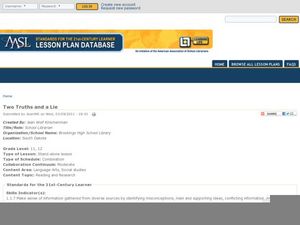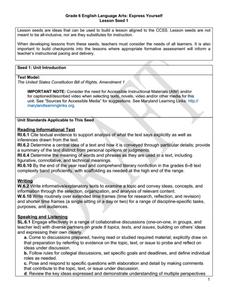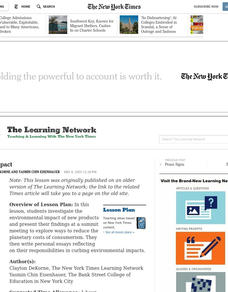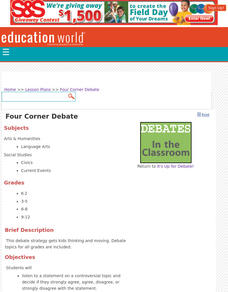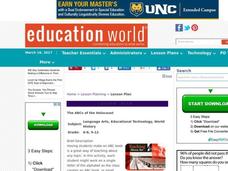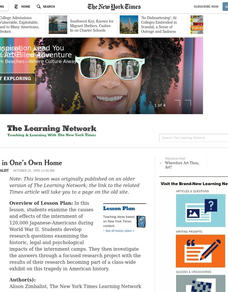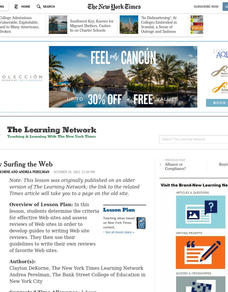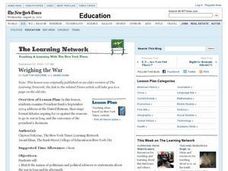Curated OER
Be That As It Maya
Creative projects are a great way to engage your class and can be a fun way to assess mastery! Learners create brochures and postcards that might have been created by and for travelers to ancient Mayan cities. They read and discuss the...
Curated OER
What Can We Learn about India from a Ten Rupee Bank Note?
The class finds and cites evidence showing India's unity in diversity and work to recognize some of the complex interactions of a civilized community. They read to understand how geography, history, politics, economics, beliefs, and...
Curated OER
Two Truths and a Lie: Internet Research Skills
It's tough for high schoolers to assess what is a credible resource and what is not. A helpful resource prompts class members to research a particular topic and record two facts—and create one lie—while documenting the sources. They then...
Curated OER
Ethos, Logos, and Pathos in Civil Rights Movement Speeches
Examine three speeches while teaching Aristotle's appeals. Over the course of three days, class members fill out a graphic organizer about ethos, pathos, and logos, complete an anticipatory guide, read speeches by Martin Luther King Jr.,...
Curated OER
Express Yourself Lesson Seed 1
Make a study of the First Amendment and its relationship to freedom. Pupils rewrite the amendment and discuss the central idea before focusing on a specific phrase. After discussing, class members write a journal entry about the included...
Curated OER
Express Yourself Lesson Seed 13: Character Development 2
Building upon prior lessons in the series, this reading and writing exercise requires pupils to look back at their own writing, track character development in the novel The Cay, and analyze how Phillip has changed. The reading focus is...
Curated OER
Deep Impact
How can acknowledging opposing viewpoints reinforce one's argument? Use this New York Times lesson to study consumerism and the environmental impact of new products. After reading the article "Whether a Hummer or a Hybrid, the Big...
Curated OER
Let There Be Peace: Nobel Prize Winners
What is the Nobel Peace Prize? After they establish criteria for great leadership, secondary learners read a New York Times article about President Jimmy Carter's acceptance of the Nobel Peace Prize in 2002. Individuals research the...
Curated OER
Four Corners Debate
Should the student population wear uniforms to school? Pupils express whether they strongly agree, agree, disagree, or strongly disagree with a controversial statement, moving to a designated corner of the room to indicate their stance....
Curated OER
Inner Circle/Outer Circle Debate Strategy
Arranged in facing concentric circles, half the class discusses an issue. The other half of the class takes notes which are then used to fuel a class discussion and to prepare editorial opinions on the topic at hand. So much emphasis is...
Curated OER
The ABCs of the Holocaust
The ABC book format is used to organize information found in a Holocaust research project. Class members use the library and/or online resources to collect information and organize their findings under key terms, places, or names. Before...
Curated OER
Sentence Combining
Learners practice sentence combining at increasingly difficult levels throughout a week. They begin with nouns and verbs and build to contrasts, parallels, etc.
Curated OER
Prisoner in One's Own Home
Examine the internment of Japanese-Americans during World War II. After reading an article from the New York Times and exploring the author's word choice, young readers find the central idea in the text and work on researching additional...
Curated OER
Showdown in the New Wild West
What is the root of the conflict between ranchers and environmentalists? Middle schoolers write their impressions of what an environmentalist is and does. They read the New York Times article "In New Wild West, It's Cowboys vs. Radical...
Curated OER
Critically Surfing the Web
The New York Times article “Online Diary,” launches this study of websites and how to assess them. Richly detailed, the lesson includes warm-up activities, procedures, journal prompts, discussion questions, and links to valuable...
Curated OER
Don't Believe the Type: Internet Ethics
What is Internet fraud? Explore Internet ethics and engage in a collaborative discussion. In order to create a Guide to Internet Honesty, learners read and discuss the article "A Beautiful Life, A Tragic Death, a Fraud Exposed." Then...
Curated OER
Persuasive/Argumentative Essay vs. Opinion writing
Reinforce persuasive and argumentative writing skills with this lesson, which utilizes SchoolNet News Network's website/SNN Monthly magazine. Young writers review journalism writing styles that help them explain that writing a persuasive...
Curated OER
Showdown on the Frontier
Especially critical following a series of shootings in schools, theaters, and religious buildings, it's safe to say that we need to evaluate the current laws on gun control. Eighth graders read a New York Times article in order to better...
Curated OER
Summer Shorts
Want to use sequence maps in your narrative writing unit? Young writers work to create personal narratives about their summer vacation. They write a narrative of their vacation and create a display using summer clothing shapes made from...
Curated OER
Encouraging Answers
What is the celebration of Columbus Day really about? Older learners use inquiry-based methods to find out who Columbus really was and what motivated his journeys. They take on the roles of town officials who must consider whether or not...
Curated OER
Hispanic World - Spain
Take your class on an electronic field trip to Spain! Visit Cordoba or Barcelona, and run with the bulls (virtually) in Pamplona. Groups search the Internet to find sites that permit them to explore the original Spanish-speaking country....
Curated OER
Weighing the War
Study opposing viewpoints with this lesson, which examines President Bush's September 2004 address at the United Nations. Middle schoolers study the text of the address, and then stage formal debates arguing for or against the reasons to...
Curated OER
A Better Class of Journal-ists
Young academics create a current events journal by skimming newspapers for articles that fit defined guidelines for informational texts. After cutting out two articles each week to add to their journals, they write a brief description of...
Curated OER
The Original's Sins
Are history textbooks plagiarized? The New York Times article, “Schoolbooks Are Given F’s in Originality,” looks at this question and forms the basis for a lesson on textbooks and plagiarism. The very detailed plan includes resource...




